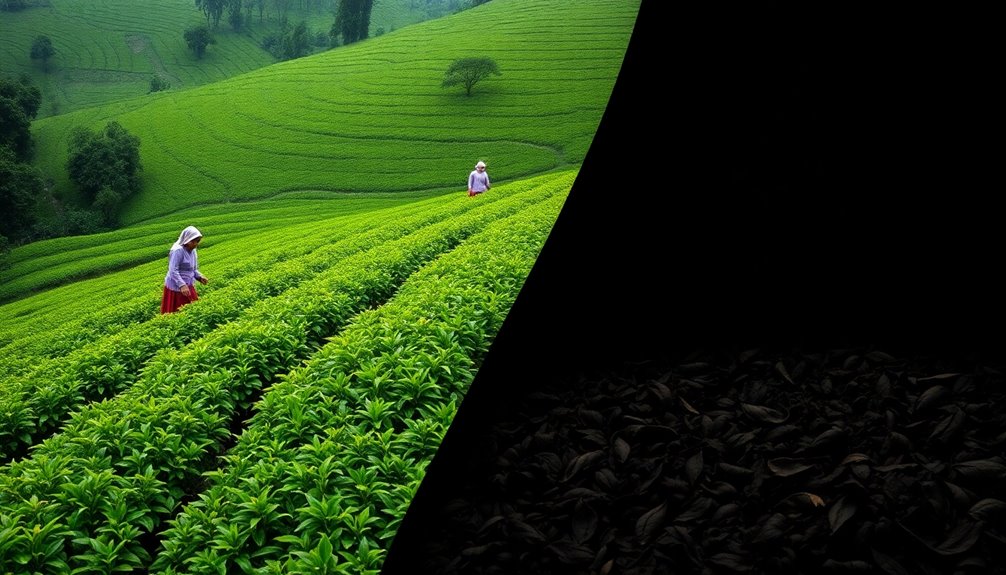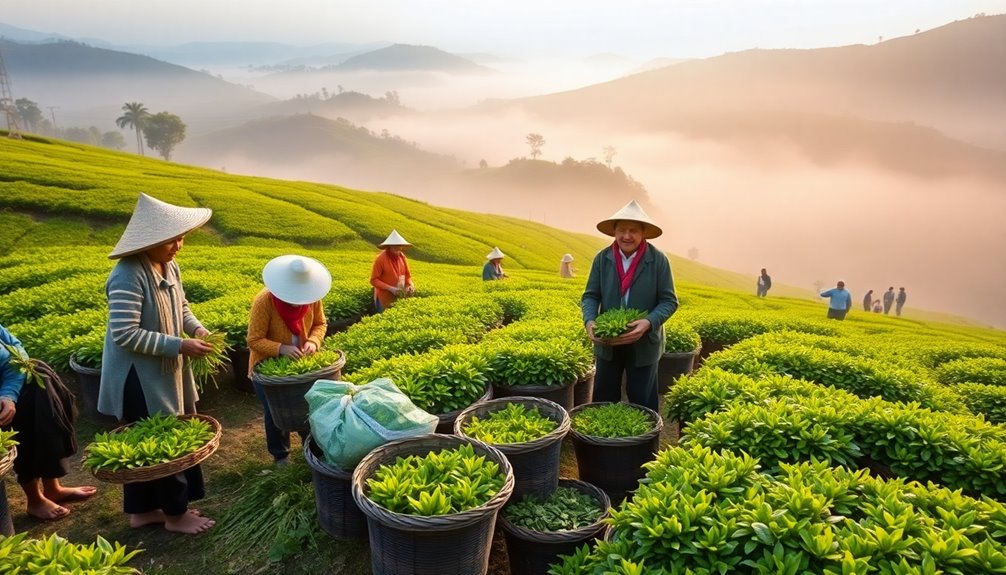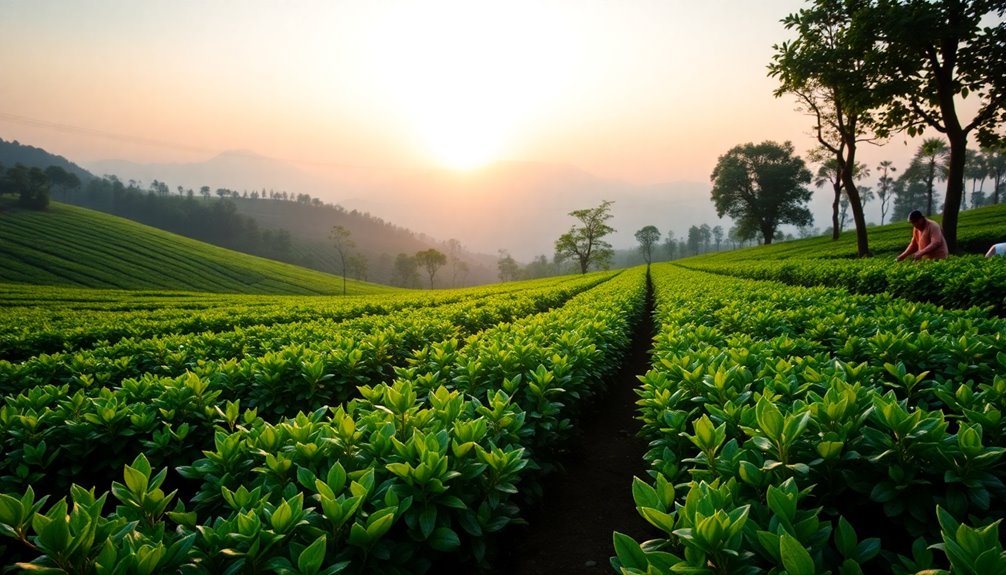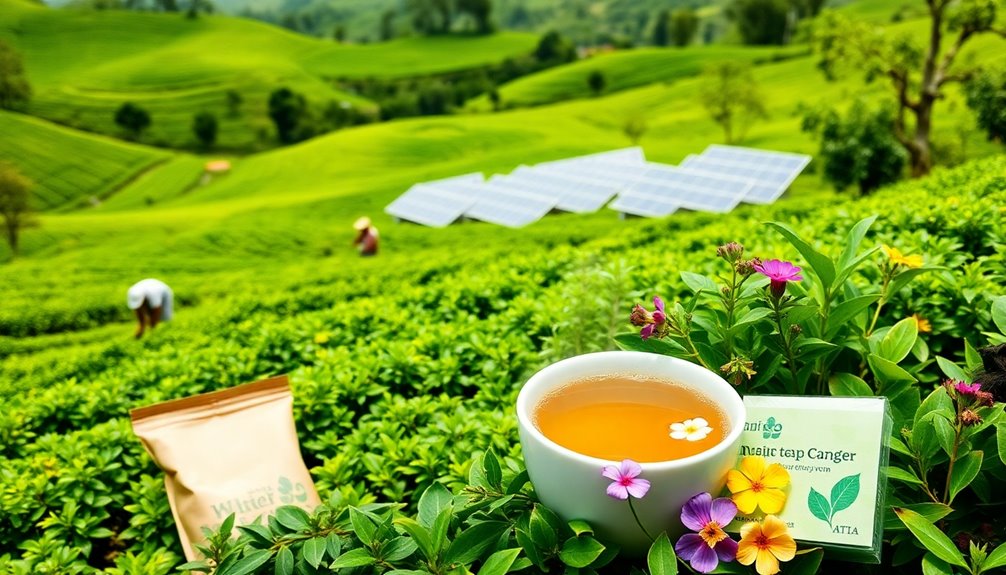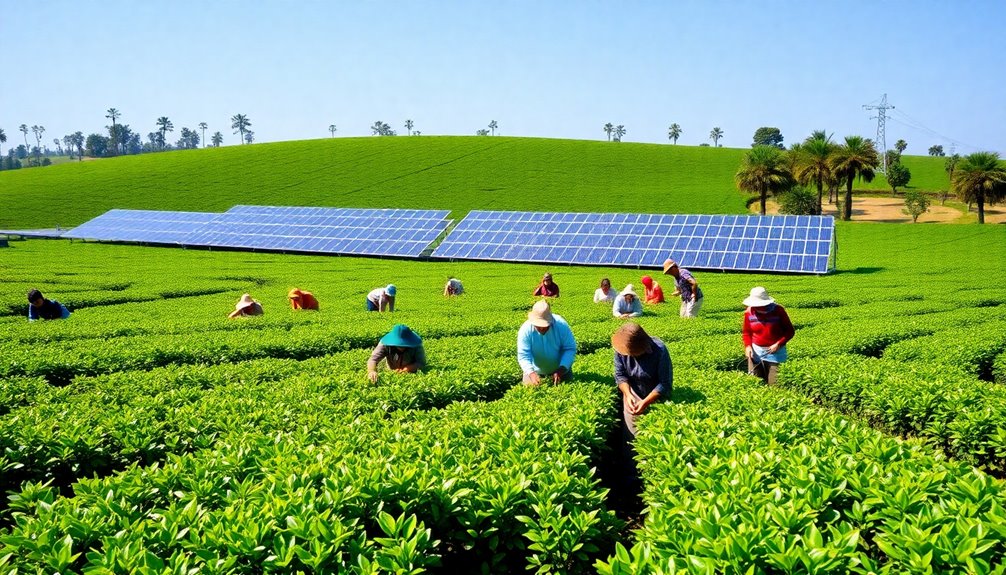The hidden costs of non-ethical tea practices include harm to the environment and unfair treatment of workers. When tea is grown without care, it can lead to deforestation and hurt wildlife. Many workers on tea farms face long hours and poor living conditions, making their lives tough. Even some Fairtrade-certified farms don't always provide safe environments or fair wages. Plus, the prices of tea can be lowered unfairly, which makes it hard for producers to earn a living. As you sip your tea, think about these issues. There's so much more to discover about how tea impacts our world!
Key Takeaways
- Non-ethical tea practices contribute to environmental degradation, including deforestation and loss of biodiversity, harming local ecosystems and wildlife.
- Exploitative labor conditions, including long hours and inadequate sanitation, persist on many tea farms, often resembling modern slavery.
- Fairtrade certification frequently fails to ensure fair wages or humane working conditions, with many certified farms still reporting labor violations.
- Price manipulation within the tea trade leads to low-quality tea and perpetuates financial instability for producers, exacerbating cycles of exploitation.
- Consumer ignorance regarding the true costs of tea production hinders efforts to promote sustainable and ethical farming practices in the industry.
Introduction
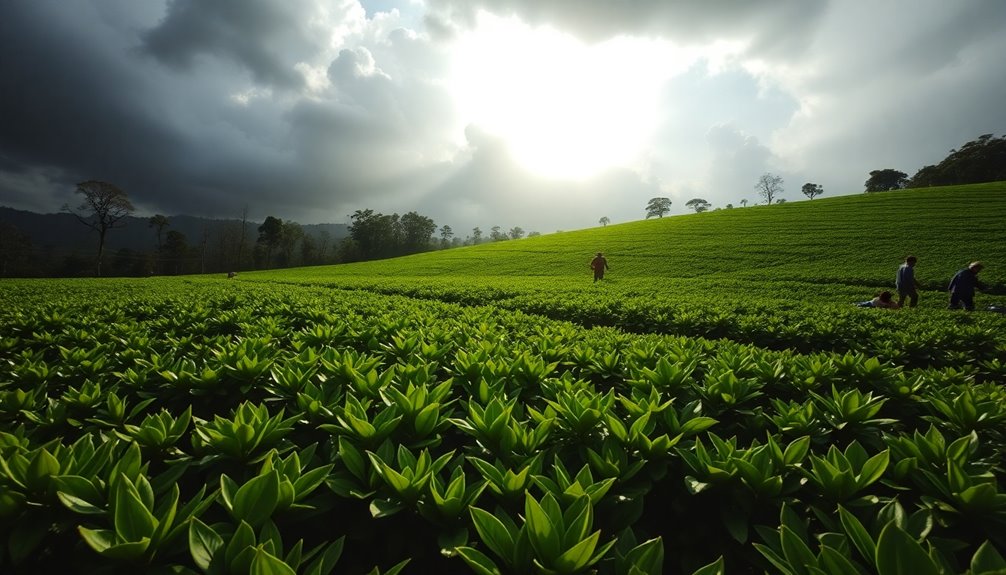
In recent years, countless consumers have become more aware of the hidden costs behind their favorite cup of tea. You mightn't realize that the tea industry can have a big environmental impact. Many tea farms use monoculture farming, which means they grow only tea plants. This practice can lead to deforestation and a loss of biodiversity.
Isn't it sad to think that our tea could be harming the planet?
Moreover, workers in the tea industry often face poor working conditions. Imagine working long hours for low wages without access to healthcare or clean water. Some workers are even trapped in unfair labor contracts, which can lead to child labor and terrible living situations.
Tea's Historical Exploitation Roots
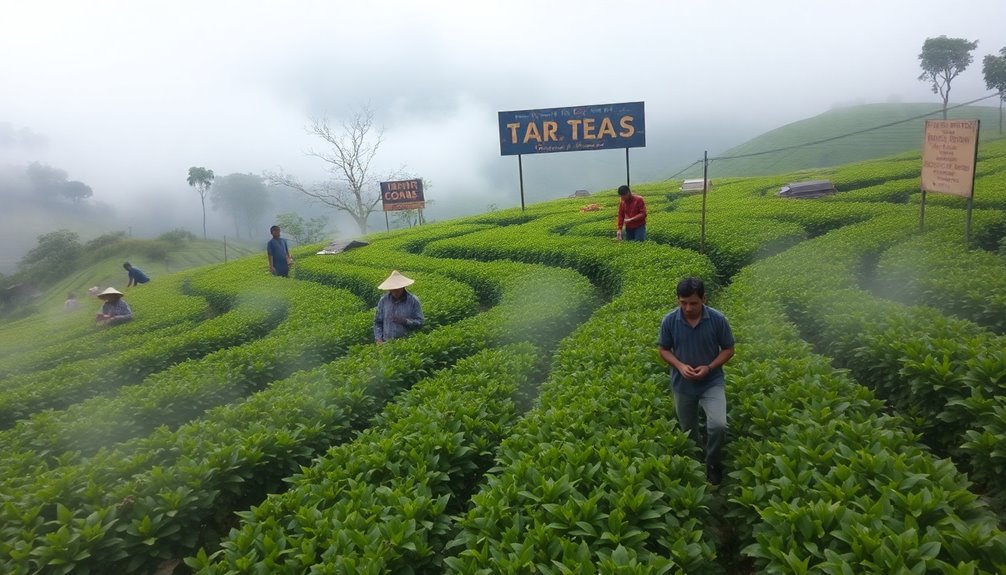
Exploiting labor in the tea industry isn't a new phenomenon; its roots stretch back to the 19th century when indentured labor systems emerged after the abolition of slavery. Many workers were misled into signing contracts with promises of a better life. Instead, they found themselves trapped in tea plantations, facing harsh realities.
In places like India and Kenya, colonial practices caused significant human rights violations. The British colonial regime forcibly displaced local communities, leading to over half a million people suffering from violent evictions linked to tea cultivation.
It's hard to imagine, but these workers endured poor working conditions. They faced long hours, strict supervision, and a culture of fear that kept them from speaking up about their problems.
Even today, reports show that many tea workers still experience exploitation, with conditions resembling slavery. They often endure physical and sexual abuse, receive inadequate pay, and lack basic rights.
This troubling history reminds us that the tea in our cups may come with hidden costs, and it's crucial to understand these roots as we sip our favorite brews.
Labor Conditions on Tea Farms
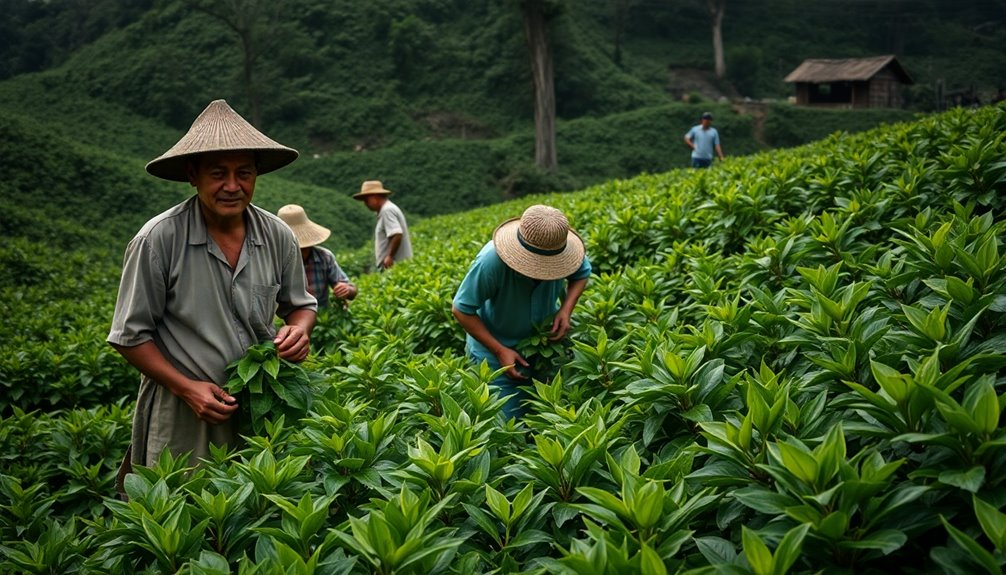
Tea farms today continue to reflect the troubling legacy of exploitation rooted in the industry's past. When you think about tea, it's easy to forget the labor conditions faced by workers. Many tea workers, especially in places like Malawi, endure long hours from sunrise to sunset.
They work under strict supervision, often living in fear. They rely on their employers for basic needs like food and water, yet many lack access to clean drinking water and sanitation.
Indentured servitude is still a reality in the tea industry. Families inherit debt obligations, which keeps them stuck in a cycle of exploitation. Reports also reveal serious human rights abuses, especially in India.
Some workers face physical and sexual violence, with management often turning a blind eye.
Even Fairtrade-certified farms aren't free from issues. A 2018 study shows that violations of labor standards happen regularly on these farms. This raises questions about how effective these ethical certifications really are in protecting workers.
Understanding these conditions is the first step toward making better choices. So, let's be aware and support truly ethical tea practices!
Consumer Misconceptions About Fairtrade
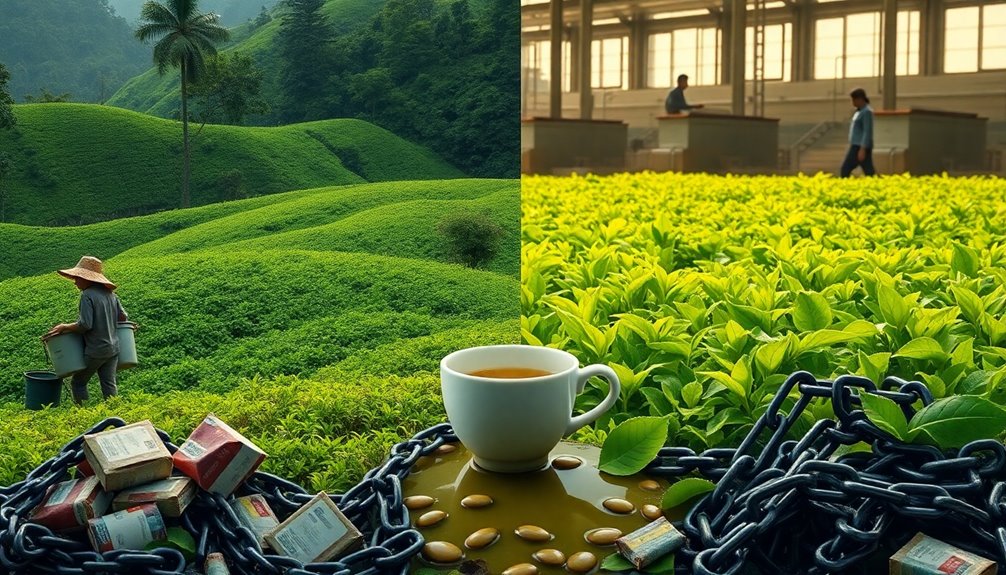
Often, consumers mistakenly believe that Fairtrade certification guarantees fair wages and humane working conditions for all workers on certified plantations. Unfortunately, that's not always true. Reports reveal that many certified farms still experience labor abuses and exploitation. This means the Fairtrade label doesn't always ensure workers are treated well.
You might think Fairtrade certification also means environmental sustainability. However, many certified teas still contribute to serious issues like deforestation and biodiversity loss. This happens because there isn't enough oversight to protect our planet.
Moreover, when you buy Fairtrade products, you might assume that the extra money goes directly to the workers. Sadly, that's often not the case. Middlemen can take away much of that premium, leaving workers with less than you'd expect.
It's essential to understand the Fairtrade model better. Instead of relying solely on certifications, consider supporting direct relationships with producers and local cooperatives. This approach can lead to more substantial support for ethical practices and help create a brighter future for everyone involved.
Price Manipulation in Tea Trade
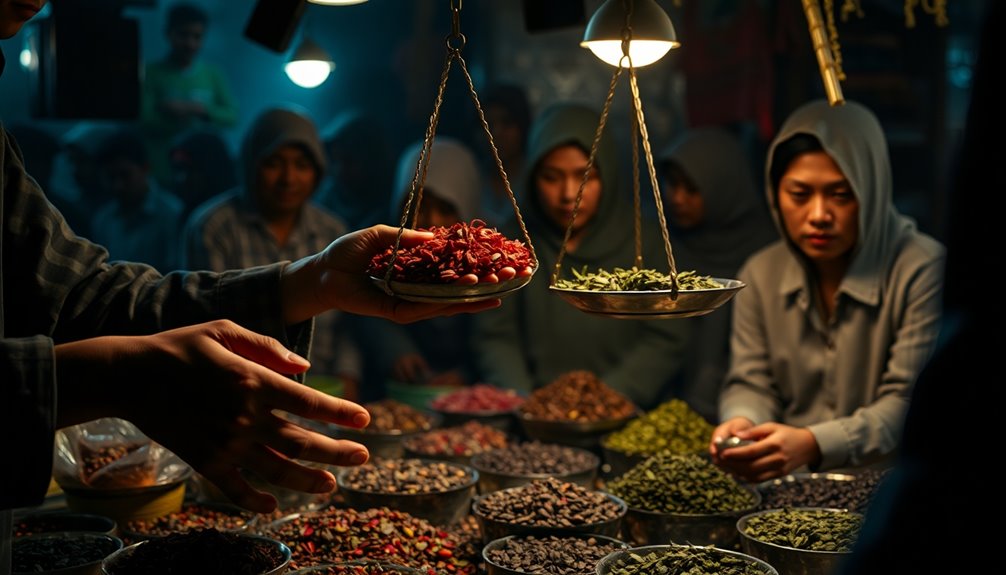
In the complex world of tea trade, price manipulation significantly impacts both producers and consumers. Big companies often focus on keeping production costs low, which leads to prices as low as $4 per kilo for low-quality tea. This tea is often produced under unethical conditions, affecting the workers' wages.
Imagine someone working hard in a tea field, only earning about $250 to $350 a month! That's not fair, right?
When you look at the average price for low-end tea, it's around $3 per ounce, mainly because of marketing, not quality. On the flip side, handpicked tea might cost $8 per ounce, but it's worth it! You can resteep it multiple times, making the cost per serving drop to about 19 cents. That's a better deal!
However, mechanization in tea harvesting brings down production costs and prices, but it also harms the quality. Machines chop indiscriminately, ruining the tea leaves' integrity.
Practical Applications
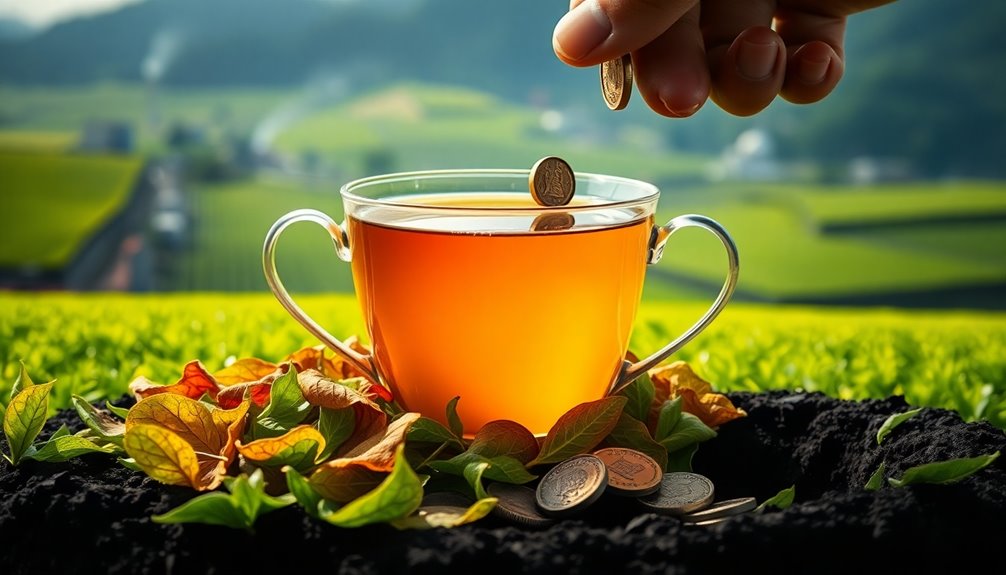
Many people don't realize the power they hold as consumers in the tea market. When you choose your tea, you're not just picking a drink; you're influencing tea farming practices around the world! By selecting organic teas from brands that support sustainable agriculture, you help protect the environment.
These choices can also fight against the loss of biodiversity, which is crucial for healthy ecosystems. When you buy higher quality, handpicked tea, you're supporting workers who deserve fair wages and good living conditions.
It's exciting to know that your purchase can lead to positive changes in the lives of those who grow and harvest tea. Remember, the tea you choose can make a big difference!
Opting for ethical brands not only tastes better but also protects our planet. As you sip your next cup, think about where your tea comes from.
By making informed choices, you can encourage the tea industry to adopt better practices. So, when you're shopping, look for those labels that promise fair treatment and eco-friendly farming.
Together, we can enjoy our tea while supporting a brighter, more ethical future!
Frequently Asked Questions
What Are the Issues in the Tea Industry?
You'll find that the tea industry faces significant issues, including unethical labor practices, environmental degradation, and exploitation of workers. These problems create challenges for sustainability and raise serious ethical concerns about how tea is produced.
Is the Tea Industry Ethical?
You'll find that the tea industry often struggles with ethical standards. Many workers face exploitation, long hours, and poor conditions, raising serious concerns about labor practices and the true cost of your tea choice.
What Is the Markup on Tea?
The markup on tea varies significantly. You'll find low-end options around $3 per ounce, while premium handpicked varieties can reach $8. This reflects labor intensity, quality, and additional costs like marketing and packaging.
What Percentage of Tea Is Fair Trade?
Only about 1% of the global tea market is Fair Trade certified. While that's a small percentage, consumer demand is growing, leading to increased sales and a shift toward more ethical tea consumption practices.
Conclusion
Now that you know about the hidden costs of non-ethical tea practices, you can make a difference! When you choose tea that supports fair labor and sustainable farming, you help workers and the planet. It's exciting to think your choices can create positive change! Next time you sip a warm cup, remember the stories behind it. Let's enjoy tea that not only tastes good but also feels good. Together, we can spread kindness with every cup!

